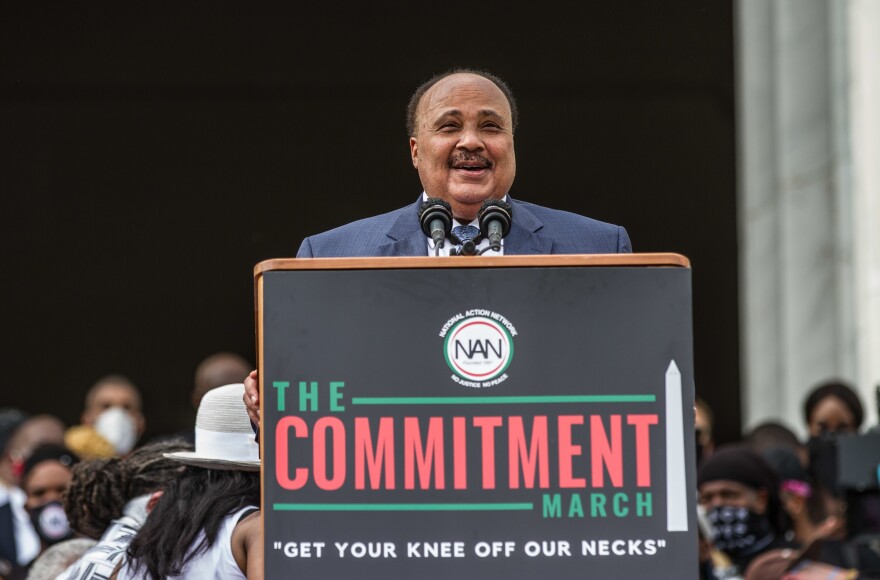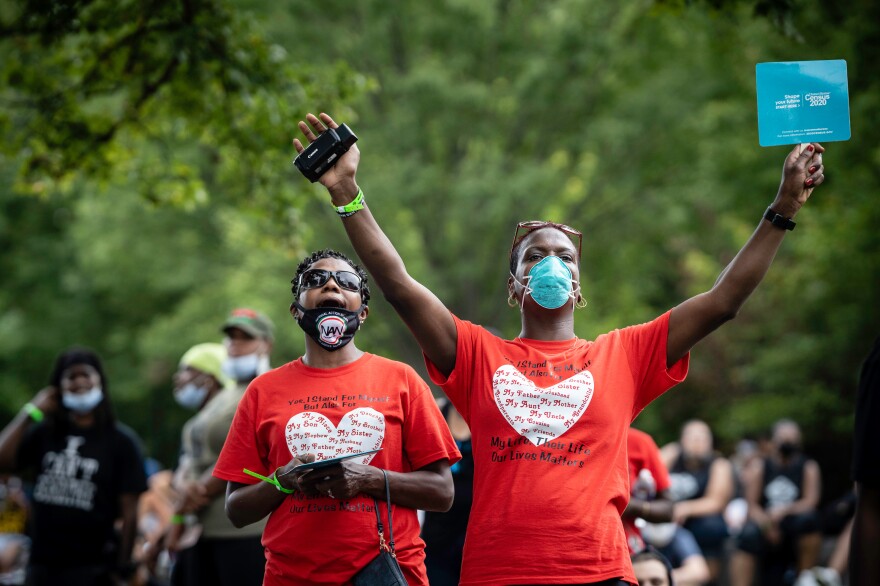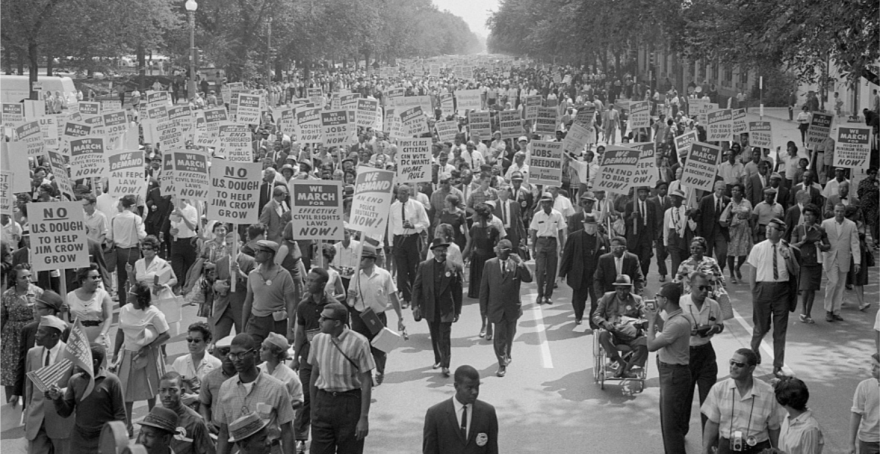Updated 4:13 p.m. ET
Thousands of demonstrators braved sweltering temperatures in the nation's capital on Friday to demand an overhaul of the country's criminal justice system and push for racial equality.
The event, called the Commitment March, was held at the Lincoln Memorial, the same site where the Rev. Martin Luther King Jr. called for those same reforms decades ago in his iconic "I Have a Dream" speech.

Like the 1963 March on Washington, organizers opened with a series of speeches before attendees began to march through the streets of the city, this time ending at the Martin Luther King Jr. Memorial.
This event – dubbed "Get Your Knee Off Our Necks" — comes at a particularly tense time as frustration over police brutality and use of force have sparked national outrage following the Memorial Day killing of George Floyd by police in Minneapolis.

''We still struggle for justice''
A common theme throughout the march was a call to action for attendees to register and to vote in the fall elections.
Several speakers led the crowd in chants of "No Justice! No Peace!" and repeated the refrain that "Black Lives Matter." At one point, some could be overheard saying, "Hands up, don't shoot."


Addressing the crowd from the steps of the Lincoln Memorial, just as his father did 57 years ago, Martin Luther King III said the civil rights struggle his dad helped lead in the 1950s and 1960s is far from over.
"We're taking a step forward on America's rocky but righteous journey towards justice," King said.

He also touched on the murder of Emmett Till, the Black teenager who was killed on Aug. 28, 1955, for allegedly whistling at a white woman in Mississippi.
"Sixty-five years later we still struggle for justice, demilitarizing the police, dismantling mass incarceration and declaring ... that Black Lives Matter."


King also encouraged members of the crowd to become the change they want and not wait on another icon, such as his father, to help champion present-day challenges.
"If you're looking for a savior, get up and find the mirror," King said. "We must become the heroes of the history we're making."


The Rev. Al Sharpton, whose National Action Network hosted the event, said he talked with the younger King about the idea for a march at Floyd's funeral in June. Sharpton gave the eulogy at that service.
"We didn't know how we were going to do it, how we were going to plan it, how many would come, but we did it," Sharpton said.
He called on Washington lawmakers to take up the George Floyd Justice in Policing Act, which the Democratic-controlled House passed but awaits a vote in the Republican-led Senate.
"We didn't just come today to have a show," Sharpton said. "Demonstration without legislation will not lead to change."

In a nod to the August temperatures that hovered around 90 degrees for most of the afternoon, Sharpton suggested that if demonstrators can endure this discomfort, then they can endure potential long lines at the polls in November.
"We didn't come out and stand in this heat because we didn't have nothing to do," Sharpton added. "We come to let you know, if we will come out by these numbers in the heat ... that we will stand in the polls all day long."
Sharpton also called on Senate Majority Leader Mitch McConnell, R-Ky., to take up a bill introduced by Senate Democrats named after the late Rep. John Lewis that would fully restore the landmark Voting Rights Act of 1965.

The Supreme Court struck down part of the law in 2013 that used a formula to determine which states needed federal election oversight.
Lewis, a civil rights icon, died last month at age 80. The congressman from Georgia was the last surviving speaker from the 1963 March on Washington.
The event also featured family members of Black Americans who have been killed by police or in other racially charged incidents, including Floyd, Breonna Taylor, Ahmaud Arbery, Trayvon Martin and others whose names have become rallying cries during recent national protests demanding justice.

"I wish George were here to see this right now," said Philonise Floyd, George Floyd's brother. "My brother, George, he's looking down right now. He's thankful for everything that everybody is doing right now."
He added that elected officials need to take notice of how the killings of Black Americans have galvanized masses.
"Our leaders, they need to follow us while we're marching to enact laws to protect us," he said, fighting back tears.


Tamika Palmer, the mother of Taylor, who was shot and killed by Louisville, Ky., police in her home in March, addressed the crowd.
She expressed gratitude to demonstrators for helping to keep her daughter's case in the public view as the crowd broke into chants of "Say her name."
"I just want to thank everybody who's been in support of getting justice for Breonna Taylor," she said. "What we need is change, and we're at a point where we can get that change, but we have to stand together [and] we have to vote."
Before the march got underway, civil rights attorney Benjamin Crump, who represents many of the victims' families, said "the problem isn't de-escalation, the problem is racism."

"Certainly, as with all these tragedies you want accountability because we can't get justice," Crump said Friday on NPR's Morning Edition.
"Justice would be George Floyd being able to take another breath today. Justice would be Breonna Taylor still being here. Justice would be Ahmaud Arbery still being here. So the only thing we can hope for right now is accountability."
Valuing Black lives
Several Democratic members of Congress also spoke at the event, including Rep. Ayanna Pressley, D-Mass., who told the crowd, "We are in unprecedented, uncertain times."
She also painted a picture of the country that she said is possible but one that eludes many Americans of color.

"Yes, it is possible to legislate justice and accountability, people over profits, joy over trauma, freedom over fear. Yes, it is possible to write budgets that actually value Black lives," she said.
Gun control activist and 2018 Parkland, Fla., high school shooting survivor Aalayah Eastmond said gun violence is a scourge on Black communities.
"Police violence is gun violence," Eastmond said. "And gun violence is the leading cause of death for Black youth. We demand to live in peace. We demand to live in spaces where the best of Black culture can thrive."

Politics of the moment
Racial justice and police reform are hot-button political issues as Election Day draws near.
Sen. Kamala Harris, the Democratic vice presidential nominee, appeared at the march via a prerecorded video, telling the crowd that the nation is on the verge of something it's never before seen. The senator from California is the first Black and first Asian American to be nominated as a vice presidential nominee by a major U.S. political party.
"If we work together to challenge every instinct our nation has to return to the status quo ... we have an opportunity to make history, right here, right now."
During the speeches Friday, news broke that President Trump had granted a full pardon to Alice Johnson, the 65-year-old Black woman whose life sentence he commuted in 2018, with the help of reality television star Kim Kardashian West.
Johnson was a featured speaker Thursday at the Republican National Convention.
In his acceptance speech Thursday, Trump underscored his self-proclaimed moniker as the "law and order president" while accusing Democratic challenger Joe Biden of being someone who repeatedly tears down America.
Meanwhile, hundreds of demonstrators gathered outside the South Lawn of the White House on Thursday night to decry racism and demand police accountability.
Jacob Blake shooting looms over march
The march also came on the heels of another high-profile shooting, that of Jacob Blake by police in Kenosha, Wis., on Sunday. Blake, a Black man, was shot seven times in the back at close range. He is paralyzed from the waist down, according to his family's lawyers.
The shooting was captured on video and went viral on social media, sparking days of demonstrations that turned deadly this week.
A 17-year-old from Illinois faces homicide charges in connection with a Tuesday night shooting in Kenosha that killed two protesters and injured a third. The suspect, a white male, reportedly has ties to a militia and is a staunch supporter of law enforcement.
The ongoing coronavirus pandemic also loomed over the event, with many in the crowd wearing facial coverings. It was clear, however, particularly on the main stage, that not everyone was following social distancing protocols.
Copyright 2021 NPR. To see more, visit https://www.npr.org. 9(MDA5NTM4MTIyMDE0MTg3NDc2MTVlZjdmNQ001))




